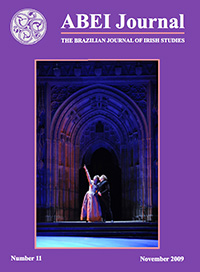Irish Women’s Migrant Writing: George Egerton’s The Wheel of God (1898)
DOI:
https://doi.org/10.37389/abei.v11i0.3650Keywords:
Irish migrant literature, George Egerton, The Wheel of GodAbstract
Until quite recently, Irish migrant literature has tended to be an absent
presence within the field of Irish Studies, and is only now beginning to be
constituted as a vitally important field of enquiry in the field. In the contemporary period, the fixed points on the map of Irish emigration have been disrupted by what Negra calls “transnationalised Irishness”: as certainties about emigration and Irish identities have undergone a series of transformations. However, the literature of 19th and 20th century Irish literary writers reveals that such fixed points were never there to begin with. Writers such as, for instance, ‘George Egerton’ [Mary Chavelita Dunne], Maeve Brennan, and contemporary writers such Anne Enright tend to construct migrant experience as a way of being in
the world rather than a journey between two fixed points, which anticipates the kind of “nomadic subjectivity” described by Braidotti. This essay, focusing on Egerton’s 1898 novel The Wheel of God, will suggest that reading Irish women’s migrant literature unsettles categories of national and diasporic identity, as their central protagonists construct themselves within a complex nexus of Irish, European, and colonial identities.


